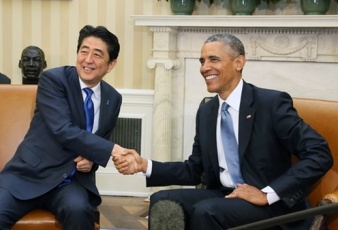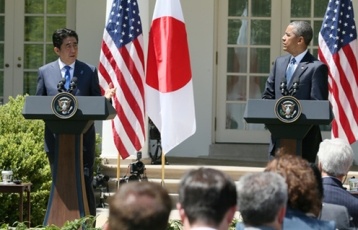Japan-United States of America Relations
Japan-U.S. Summit Meeting
 (Photo: Cabinet Public Relations Office)
(Photo: Cabinet Public Relations Office)
 (Photo: Cabinet Public Relations Office)
(Photo: Cabinet Public Relations Office)
On April 28, commencing at 9:50 a.m. for approximately two hours during his official visit to Washington D.C., Prime Minister Shinzo Abe held a Japan-U.S. Summit Meeting with the Honorable Barack H. Obama, President of the United States of America. Below is the overview. As a result of this meeting, the following documents were issued: (1) the Japan-U.S. Joint Vision Statement; (2) the Japan-U.S. Joint Statement on the Treaty on the Non-Proliferation of Nuclear Weapons (NPT) (PDF) ; and (3) FACT SHEET: Japan-U.S. Cooperation for a More Prosperous and Stable World.
; and (3) FACT SHEET: Japan-U.S. Cooperation for a More Prosperous and Stable World.
1. Opening Remarks
(1) President Obama noted that Prime Minister Abe was advancing the Japanese economy and seeking to revitalize it, and expressed the support of the United States for those efforts. Additionally, President Obama said that Japan and the United States were making efforts to further vitalize their security relationship, and that strengthening the Japan-U.S. Alliance would be important for addressing various challenges in the region. Furthermore, President Obama stated that there was no more reliable partner than Japan when addressing various global challenges and working in the international arena, and that Prime Minister Abe’s courage and strength were important for both the United States and the world.
(2) In response, Prime Minister Abe emphasized the historic significance of his visit to the United States in this milestone year marking the 70th anniversary of the end of World War II, and expressed his gratitude for the invitation to make the official visit. Prime Minister Abe also stated that through his visit to the United States two years ago, President Obama’s state visit to Japan one year ago and this official visit, the Japan-U.S. Alliance has been greatly strengthened. Furthermore, Prime Minister Abe expressed his intention to take the opportunity of this Summit Meeting to send out a powerful message at home and abroad that the Japan-U.S. Alliance, whose foundation is a set of fundamental values of freedom, democracy, human rights and the rule of law, would fulfill a leading role in ensuring peace and prosperity of the Asia-Pacific region and the world.
2. Japan-U.S. Relations
(1) Security
(i) Security and Defense Cooperation
The two leaders voiced their appreciation over the success of the Japan-U.S. “2+2” meeting that was held on April 27, and confirmed that the alliance’s deterrence and response capability would be further strengthened under the new Guidelines for Japan-U.S. Defense Cooperation issued after the meeting.
Also, Prime Minister Abe explained that Japan was working vigorously on developing security legislation. President Obama responded by stating his support for Japan’s initiatives.
(ii) Realignment of U.S. Forces in Japan
Concerning the relocation of Marine Corps Air Station (MCAS) Futenma, Prime Minister Abe explained that he had recently held his first meeting with Governor of Okinawa Prefecture Takeshi Onaga and stated that despite Governor Onaga’s opposition to the plan to construct the Futenma Replacement Facility (FRF) at Henoko, the unwavering position of the Government of Japan is that the relocation to Henoko is the only solution, and the Government continues to hold dialogue in order to obtain Okinawa’s understanding. Furthermore, to that end, Prime Minister Abe explained that it was a priority for the Government to reduce the impact on Okinawa, including through increasing training of MV-22 Osprey outside the prefecture and the land returns south of Kadena Air Base. In addition, Prime Minister Abe stated that with regard to the suspension of the operation of MCAS Futenma within 5 years, Foreign Minister Fumio Kishida had explained to Secretary of State John Kerry at the Japan-U.S. “2+2” meeting. Prime Minister Abe expressed his will to sign the Agreement to Supplement the Japan-U.S. Status of Forces Agreement (SOFA) on Environmental Stewardship at an early date. Prime Minister Abe also asked for the cooperation of the United States in order to obtain the public support for the Japan-U.S. Alliance. In response, President Obama said the United States would continue to cooperate to reduce the impact on Okinawa.
Prime Minister Abe further explained that the relocation of the U.S. Marines in Okinawa to Guam would promote the development of Guam as a strategic hub and would also contribute to U.S. rebalance policy, and expressed his intention to steadily advance the relocation in coordination with the United States.
(2) TPP
(i) Prime Minister Abe welcomed the progress in the deliberations on Trade Promotion Authority (TPA) in the U.S. Congress, and expressed his appreciation for President Obama’s efforts. The two leaders reaffirmed the strategic significance of the Trans-Pacific Partnership (TPP) and its expected contribution not only to economic prosperity but also to security in the region.
(ii) Prime Minister Abe cited the recent negotiations between Minister in charge of TPP Akira Amari and U.S. Trade Representative Michael Froman, and welcomed the progress that had been made on the remaining issues between Japan and the United States. The two leaders confirmed that progress in the bilateral consultation would provide substantial momentum toward the conclusion of the TPP, and shared the view that both countries would lead the negotiations and guide them to a prompt conclusion.
3. Regional Affairs
(1) Asia
(i) Prime Minister Abe explained the outcomes of the most recent Japan-China Summit Meeting on the margins of the Bandung Conference.
(ii) Both leaders agreed that Japan and the United States would play key roles to maintain and develop a free and open Asia-Pacific region based on the rule of law, and that both countries would cooperate to incorporate China into such region. The two leaders also affirmed their opposition to any unilateral attempts by China to change the status quo. President Obama reiterated that Article 5 of the Japan-U.S. Treaty of Mutual Cooperation and Security covers all the territories under the administration of Japan, including the Senkaku Islands.
(iii) Both leaders confirmed that Japan and the United States were pursuing various measures to resolve the issues in the South China Sea, including supporting a united ASEAN response.
(iv) Both leaders also confirmed the fundamental positions of Japan and the United States with regard to the Asian Infrastructure Investment Bank (AIIB). Prime Minister Abe stated that while there was a huge demand for infrastructure in Asia, when creating a financial institution such as the AIIB it would be necessary to ensure fair governance. In light of this, Prime Minister Abe expressed the view that Japan and the United States would cooperate and engage in a dialogue with China.
(v) Prime Minister Abe explained Japan’s efforts to improve relations with the Republic of Korea (ROK), and President Obama expressed his support for such efforts.
(vi)With regard to North Korea, Prime Minister Abe explained Japan’s consistent policy of pursuing a comprehensive resolution of outstanding issues of concern including the abduction, nuclear, and missile issues. Both leaders reaffirmed that Japan, the United States, and the ROK would coordinate their responses to the North Korea nuclear and missile issues. Prime Minister Abe also stated Japan’s intention to resolve the abductions issue at the earliest stage and President Obama expressed his understanding and support for these efforts.
(2) Ukraine
Prime Minister Abe said that while continuing to monitor the local situation in Ukraine and prioritizing coordination with the G7, Japan would respond appropriately, including working on Russia, to achieve a peaceful and diplomatic resolution. Both leaders agreed that they would continue to support the reform efforts in Ukraine.
(3) Iran
Prime Minister Abe welcomed the recent agreement on the nuclear issue and expressed his complete support for President Obama’s policies. He also described the outcomes of the recent Japan-Iran Summit Meeting held during the Bandung Conference, and explained that Japan would continue to work with Iran and play its own role.
4. Global Issues
(1) Both leaders shared the view that the importance of global cooperation through the Japan-U.S. Alliance is increasing, and discussed measures to address climate change and infectious diseases.
(2) As part of these discussions, Prime Minister Abe said that Japan would make proactive contributions toward the adoption of a framework applicable to all Parties at COP21. Prime Minister Abe also stated that with regard to Japan’s efforts to reduce emissions, he would explain Japan’s position on its target which is as equally ambitious as other Parties’ at the forthcoming G7 Summit.

